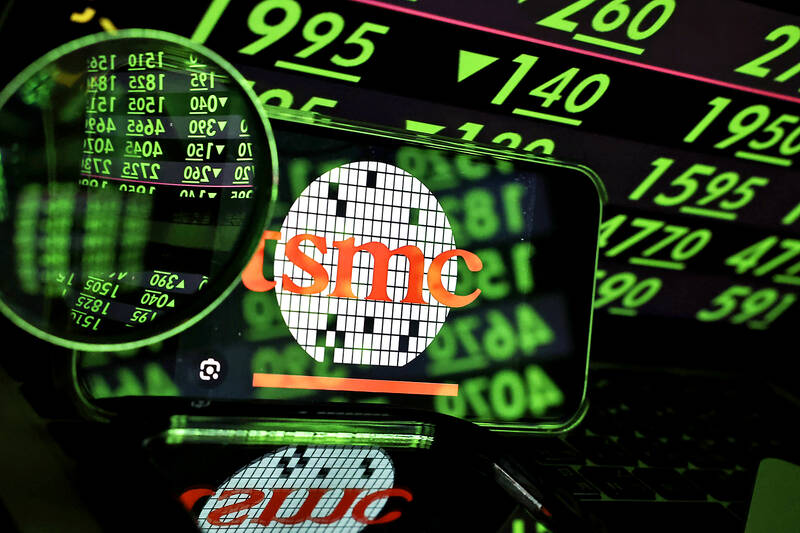The TAIEX yesterday recorded its third-steepest fall in history, falling almost 1,000 points in a sell-off triggered by a tumble on Wall Street overnight amid growing concerns over the possible hard landing of the US economy, dealers said.
Technology stocks led the downturn on the main board as investors took their cues from a plunge in the shares of US-based artificial intelligence (AI) chip designer Nvidia Corp, which is facing an antitrust investigation by the US Department of Justice, dealers added.
The TAIEX closed down 999.46 points, or 4.52 percent, at 21,092.75, with the loss the third-sharpest fall after a drop of 1,807.21 points on Aug. 5 and a decline of 1,004.01 recorded on Aug. 2.

Photo: CNA
The heavy losses pushed the market capitalization of the main board down by NT$3.17 trillion (US$98.48 billion) to NT$67.36 trillion, the first time in nearly a month that market value fell below the NT$70 trillion mark.
Elsewhere in Asia, Japan’s benchmark Nikkei 225 index lost 4.2 percent and South Korea’s KOSPI was down 3.2 percent.
Australia’s S&P/ASX 200 was down 1.9 percent, Hong Kong’s Hang Seng index declined 1.1 percent and the Shanghai Composite index shed 0.7 percent.
The focus was on the monthly Institute for Supply Management (ISM) manufacturing survey data published on Tuesday, showing that the contraction in US manufacturing activity continued into a fifth consecutive month last month as demand remained weak.
The ISM manufacturing index was 47.2 percent, up 0.4 percentage points from a month earlier, but still well below the 50-point mark separating expansion from contraction.
The figure was slightly below market expectations of 47.9, according to Briefing.com.
“The latest manufacturing activity raised fears over a possible hard landing for the US economy, sending ripples through US stock markets overnight,” Mega International Investment Services Corp (兆豐國際投顧) analyst Alex Huang (黃國偉) said.
“More importantly, Nvidia shares reported a steep fall [of 9.53 percent] overnight as the US Department of Justice sent a subpoena to Nvidia to seek evidence that the chipmaker violated antitrust laws, which turned many investors away from tech stocks on US markets and on regional markets,” Huang said.
Coming under great pressure, contract chipmaker Taiwan Semiconductor Manufacturing Co (TSMC, 台積電) lost 5.43 percent to close at NT$889, its lowest closing level since Aug. 6. The stock contributed about 413 points to the TAIEX’s fall yesterday.
In the wake of Nvidia’s slump, AI-related stocks also moved sharply lower, with AI server maker Quanta Computer Inc (廣達) falling 8.09 percent and rival Wistron Corp (緯創) shedding 5.15 percent.
Foreign investors sold a net NT$100.75 billion of Taiwanese shares yesterday, a record daily outflow according to Bloomberg-compiled data that started in 2000.
“Taiwan’s and TSMC’s share performance have become increasingly correlated with Nividia’s over the past year, and recent market volatility is reflecting concerns on the AI demand outlook,” Bloomberg Intelligence strategist Marvin Chen said. “While the earnings growth for the chip sector still looks strong, valuations may be a near-term concern.”

ADVANCED: Previously, Taiwanese chip companies were restricted from building overseas fabs with technology less than two generations behind domestic factories Taiwan Semiconductor Manufacturing Co (TSMC, 台積電), a major chip supplier to Nvidia Corp, would no longer be restricted from investing in next-generation 2-nanometer chip production in the US, the Ministry of Economic Affairs said yesterday. However, the ministry added that the world’s biggest contract chipmaker would not be making any reckless decisions, given the weight of its up to US$30 billion investment. To safeguard Taiwan’s chip technology advantages, the government has barred local chipmakers from making chips using more advanced technologies at their overseas factories, in China particularly. Chipmakers were previously only allowed to produce chips using less advanced technologies, specifically

BRAVE NEW WORLD: Nvidia believes that AI would fuel a new industrial revolution and would ‘do whatever we can’ to guide US AI policy, CEO Jensen Huang said Nvidia Corp cofounder and chief executive officer Jensen Huang (黃仁勳) on Tuesday said he is ready to meet US president-elect Donald Trump and offer his help to the incoming administration. “I’d be delighted to go see him and congratulate him, and do whatever we can to make this administration succeed,” Huang said in an interview with Bloomberg Television, adding that he has not been invited to visit Trump’s home base at Mar-a-Lago in Florida yet. As head of the world’s most valuable chipmaker, Huang has an opportunity to help steer the administration’s artificial intelligence (AI) policy at a moment of rapid change.

The New Taiwan dollar is on the verge of overtaking the yuan as Asia’s best carry-trade target given its lower risk of interest-rate and currency volatility. A strategy of borrowing the New Taiwan dollar to invest in higher-yielding alternatives has generated the second-highest return over the past month among Asian currencies behind the yuan, based on the Sharpe ratio that measures risk-adjusted relative returns. The New Taiwan dollar may soon replace its Chinese peer as the region’s favored carry trade tool, analysts say, citing Beijing’s efforts to support the yuan that can create wild swings in borrowing costs. In contrast,

TARIFF SURGE: The strong performance could be attributed to the growing artificial intelligence device market and mass orders ahead of potential US tariffs, analysts said The combined revenue of companies listed on the Taiwan Stock Exchange and the Taipei Exchange for the whole of last year totaled NT$44.66 trillion (US$1.35 trillion), up 12.8 percent year-on-year and hit a record high, data compiled by investment consulting firm CMoney showed on Saturday. The result came after listed firms reported a 23.92 percent annual increase in combined revenue for last month at NT$4.1 trillion, the second-highest for the month of December on record, and posted a 15.63 percent rise in combined revenue for the December quarter at NT$12.25 billion, the highest quarterly figure ever, the data showed. Analysts attributed the